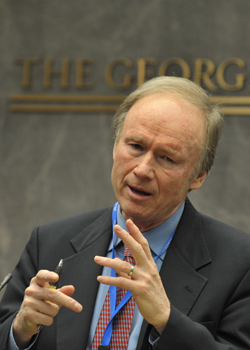Ideology, Neutrality, and Self-Deception: What the Supreme Court Says and What the Public Hears
In the second panel of the symposium, speakers examined the psychological constructs and ideologies that influence the Supreme Court’s decision-making and the public’s perceptions of those decisions. The panel featured a variety of first-hand empirical data drawn from law-themed social research.
Carolyn Shapiro – Admitting Subjectivity and Claiming Neutrality in Confirmation Hearings
Professor Carolyn Shapiro—director of Chicago-Kent’s Institute on the Supreme Court of the United States—focused on justices’ claims of “neutrality” in their confirmation hearings. In his confirmation hearing, Chief Justice John Roberts likened judges to neutral umpires, objectively interpreting cases. However, because many cases decided by the Supreme Court require the exercise of subjective judgment, these claims of neutrality can cause cognitive dissonance in the average person when justices who claim to be neutral reach conclusions that that person does not agree with.
Shapiro presented the findings of an original study that looked at 30 confirmation hearings of Supreme Court nominees since 1955, when the confirmation hearing process became a requirement for all nominees. In these hearings, she investigated whether the nominee claimed that judging is objectively neutral or whether the nominee discussed subjective judgment as an inevitable or good aspect of judging. Shapiro also tracked independent variables such as the perceived ideology or party of the nominee and the political party of the Senators posing questions in the hearing.
Shapiro found that a nominee was more likely to claim neutrality when the hearing was more recent, when the questioning Senator was a Republican, and when the questioning Senator’s party was in opposition to the president’s party. The nominee was more likely to acknowledge subjectivity if the nominee was a Democratic appointee.
If the party of a nominee or of a Senator affects whether the nominee claims absolute neutrality or admits to some subjectivity, what does this mean for the Court’s legitimacy? Would it be better for all parties to admit the same things, including an uncertainty about how judgments are made? Shapiro addressed these implications in the final section of her presentation, stressing the need for future research in this area. Questions about the Court’s legitimacy are key, she said, especially when there is a mismatch between the claims made at confirmation hearings and the way the Court reaches its actual decisions. An article summarizing this study will appear in a forthcoming issue of the Chicago-Kent Law Review.
Professor Shapiro has written extensively on the Supreme Court and has advocated for the use of careful empirical research in studying the Court. Visit her SSRN and Bepress pages to read more of her scholarship, including articles on the Supreme Court such as “Oral Dissenting on the Supreme Court” (with Chicago-Kent faculty member Christopher Schmidt), “The Context of Ideology: Law, Politics, and Empirical Legal Scholarship,” and “The Law Clerk Proxy Wars: Secrecy, Accountability, and Ideology in the Supreme Court.”
Professor Shapiro was joined in the second panel by Dan Kahan (Yale), Dan Simon (USC) and Nicholas Scurich (UC-Irvine), Tom Tyler (Yale), and moderator Chris Buccafusco (Chicago-Kent).



Leave a Reply